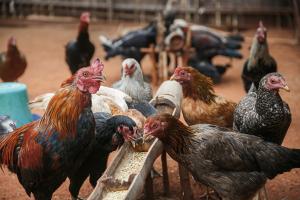Improving Food Safety and Conservation
A series of training videos for poultry farmers

Hunting and fishing have provided food and income to rural communities for thousands of years; However, as communities grow and pressures on wildlife and their habitat mount, hunting bushmeat and fishing are becoming less sustainable in many regions. As a result, food security and traditions of many rural communities are exposed.
Developing family poultry production is one effective way to produce high-quality proteins and supplemental income for many less affluent households. Rearing poultry has a number of advantages: (i) it does not require a heavy financial investment, (ii) it does not take a tremendous amount of time, (iii) it has a good feed conversion ratio, (iv) it has a low environmental impact, and (v) poultry meat and eggs are an excellent source of nutrients and the basis for many healthy and delicious meals.
In areas with low burdens of entry, medium to large-scale commercial poultry farms are an effective way for developing communities to profit from the versatility. Unfortunately, in many remote places, large scale farms are not as feasible due to higher costs of goods sold (i.e. feed, start-up chicks, appropriate sanitation equipment and supplies like antibiotics and vaccines). In some developing countries, family poultry farming contributes up to 80 percent of the country’s poultry stocks thanks to small-scale farmers raising flocks of hundreds starting from just a few chickens (FAO 2014).
The Sustainable Wildlife Management (SWM) Programme supports various scales of poultry farms, from intensive farming in small towns like Mambasa in the Democratic Republic of the Congo to family poultry producers with village chicken like Nirina in Madagascar. In Northern Congo, a partnership between the World Poultry Foundation and the USAID funded project “Conserving the biodiversity of northern Congo by diversifying the livelihoods of bushmeat value chain agents and increasing poultry production”, is developing an innovative model whereby small-scale rural farmers can source dual purposed birds from medium-sized breeders in urban areas. Combining improved, dual-purpose birds, vaccination against Newcastle disease and low-tech hen houses to protect the birds from predators substantially increases production of eggs and meat.
Whilst there are many good online technical poultry guides out there, these publications are often too complex for small family farmers. To support novice farmers looking to improve and increase their poultry production, the SWM Programme has developed an engaging series of 8 training videos. The videos, covering topics that range from health and biosecurity to nourishing your flock and egg collection, will help instruct farmers on best practices and truly reinforce that poultry farming can undoubtedly improve their families’ and communities’ health, wealth and wellbeing.
From the Highlands of Papua New Guinea across Africa to the Rupununi region of Guyana, these videos have received an enthusiastic welcome from the indigenous communities who are taking interest in developing their own poultry farms - men, women and children alike! Take, for instance, Guyana, with the “local meat, you can’t beat” campaign bolstered by an enthusiastic, local NGO, the Rupununi Livestock Producers Association, promoting farmers who are creating a viable future in poultry farming.
With this video series, the SWM Programme expects to contribute to making Nirina’s hopes come true: “If this works out, we won’t need to go hunting so much, and I’ll be able to help others get that little bit more out of life”.
The SWM Programme is an initiative of the Organisation of African, Caribbean and Pacific States, funded by the European Union and co-financed by the French Facility for Global Environment and the French Development Agency. It is implemented by a consortium of partners which includes the Food and Agriculture Organisation of the United Nations (FAO), the French Agricultural Research Centre for International Development (CIRAD), the Center for International Forestry Research (CIFOR) and the Wildlife Conservation Society (WCS).
Learn more